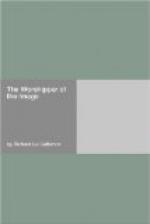“I cannot help it, Antony. I know it is foolish, but I cannot help it. I think living in this place has made me morbid. She seems so alive—so evil, so cruel. I am sorry you bought her, Antony. I cannot bear to look at her. Won’t you take her away? Take her up into the wood. Keep her there. Take her now. I shall not be able to sleep all night if I know she is in the house.”
She was half hysterical, and Antony soothed her gently.
“Yes, yes, dear. I’m sorry. I’ll take her up the wood now this minute. Wait till I light the lantern. Poor Beatrice, I never dreamed she would affect you so. I loved her, dear—because I love you; but I would rather break her in pieces than that she should make you unhappy. Though to break any image of you, dear,” he added tenderly, “would seem a kind of sacrilege. You know how I love you, Beatrice, don’t you?”
“Of course I do, dear; and it was sweet of you to buy her for my sake, and I’m quite silly to-night. To-morrow I shall think nothing about her. Still, dear, she does frighten me, I can’t tell why. There seems something malignant about her, something that threatens our happiness. Oh, how silly I am—”
Meanwhile, Antony had lit an old brass lantern, and presently he was flashing his way up among the dark sounds of the black old wood, with that ghostly face tenderly pressed against his side.
He stopped once to turn his lantern upon her. How mysterious she looked, here in the night, under the dark pines!
He too felt a little haunted as he climbed his chalet staircase and unlocked the door, every sound he made echoing fatefully in the silent wood; and when he had found a place for the image and hung her there, she certainly looked a ghostly companion for the midnight lamp, in the middle of a wood.
How strangely she smiled, the smile almost of one taking possession.
No wonder Beatrice had been frightened. Was there some mysterious life in the thing, after all? Why should these indefinite forebodings come over him as he looked at her!—But he was growing as childish as Beatrice. Surely midnight, a dark wood, a lantern, and a death-mask, with two owls whistling to each other across the valley, were enough to account for any number of forebodings! But Antony shivered, for all that, as he locked the door and hastened back again down the wood.
CHAPTER III
THE NORTHERN SPHINX
Antony had not written a poem to his wife since their little girl Wonder had been born, now some four years ago. Surely it was from no lack of love, this silence, but merely due to the working of what would seem to be a law of the artistic temperament: that to turn a muse into a wife, however long and faithfully loved, is to bid good-bye to the muse. But a day or two after the coming of Silencieux, Antony found himself suddenly inspired once more to sing of his wife. It was the best poem he had written for a long time, and when it was finished, he came down the wood impatient to read it to Beatrice. This was the poem, which he called “The Northern Sphinx":—




